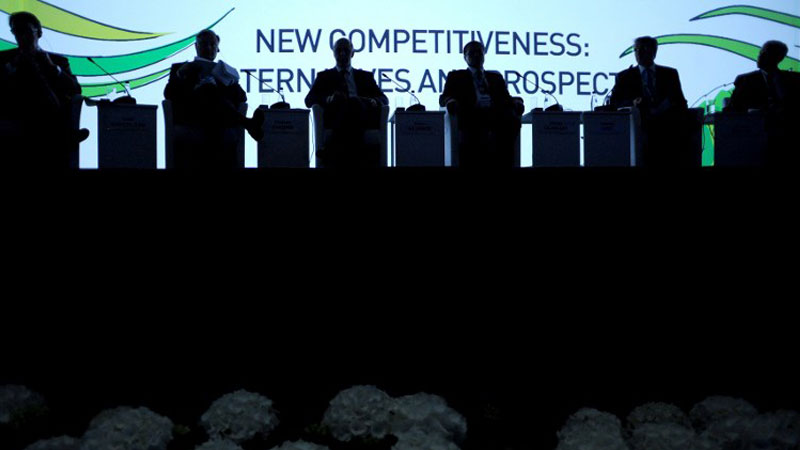Russia’s Davos opens amid worries, Western no-shows

Participants take part in the annual Economic Forum in Saint-Petersburg, on Thursday, May 22, 2014. President Vladimir Putin’s showcase economic forum opened Thursay in his hometown Saint Petersburg as worries grow over Russia’s economy and after pullouts by Western business chiefs over the crisis in Ukraine. The Saint Petersburg Economic Forum is touted as Russia’s answer to Davos, an annual meeting of global business leaders which President Vladimir Putin has attended every year since 2005 and often uses to sign major deals and rub shoulders with state leaders. AFP PHOTO / OLGA MALTSEVA
SAINT PETERSBURG, Russia—President Vladimir Putin’s showcase economic forum opened in his hometown on Thursday amid worrying times for Russia’s economy and pullouts by Western business chiefs over the crisis in Ukraine.
Fresh from signing a huge $400-billion gas deal this week with China, Putin will give the keynote address on Friday at the annual Saint Petersburg International Economic Forum.
Touted as Russia’s answer to the gathering of business heavyweights in Davos, the forum this year includes top Russian officials, hundreds of the country’s business leaders and foreign CEOs including BP chief Bob Dudley and Total’s Christophe de Margerie.
But more than anything this year’s forum will be marked by the absence of more than 30 top Western executives who reportedly pulled out as a result of the crisis in Ukraine.
The United States and European Union have stepped up pressure on Moscow over its annexation of Crimea in March and alleged support for pro-Russian rebels who have seized control of parts of eastern Ukraine.
Sanctions including visa bans and asset freezes have been imposed on dozens of Russian officials and the West has warned of wider-ranging penalties if the situation in Ukraine does not improve.
Among those who canceled plans to attend this year’s forum were top executives from Deutsche Bank, Siemens, Goldman Sachs, PepsiCo and Morgan Stanley, US and Russian media reported.
A White House spokeswoman said earlier this month it would “send an inappropriate message” for senior US businessmen to attend the forum.
The New York Times has reported that senior White House officials personally contacted several business leaders to urge them not to travel to Saint Petersburg.
Russian officials have downplayed the cancellations, with Deputy Economy Minister Sergei Belyakov earlier this month jokingly thanking the White House for the “good advertisement.”
‘Serious consequences’ from sanctions
But as the forum opened, Eckhard Cordes of Germany’s Committee on Eastern European Economic Relations, told participants Russia’s reputation was taking a beating.
“Winning the confidence of investors can take years but it can sometimes be destroyed in a matter of minutes,” he said.
“In the long run, economic sanctions can only be avoided if the Russian government restores international confidence.”
Noting that Russia’s annexation of Crimea was widely criticized, Cordes said: “There are great fears out there that the Russian government might also behave in a similar way in other places.”
Russia’s First Deputy Prime Minister Igor Shuvalov told journalists on the sidelines of the forum that Western pressure was having an effect.
“We feel and understand that the informal character of this pressure that is being applied now by the United States and European Union—all of this has serious consequences for our economy,” news agency RIA-Novosti quoted Shuvalov as saying.
There were reasons enough to worry about the state of Russia’s economy even before the unofficial boycott.
After years of solid growth, Russian economic output has slowed in recent years and uncertainty over the Ukraine crisis has brought the country to the edge of recession.
Russia reported a sharp slowdown in growth in the first quarter, with the economy expanding by only 0.9 percent on an annual comparison, down from two percent in the last quarter of 2013.
The International Monetary Fund is predicting overall growth of only 0.2 percent in Russia this year, amid capital flight of up to $100 billion as fearful investors and savers move funds outside the country.
In the first quarter alone, capital flight hit $50.6 billion, the central bank has said.
As the forum opened, Finance Minister Anton Siluanov admitted Russia needed to do more to reassure investors.
“Investors are worried about instability. Our duty is to continue on the path that Russia has followed in recent years,” he said. “Our answer to sanctions will be to improve the business climate.”
Officials said more than 6,500 people from 62 countries were taking part in the forum, which ends on Saturday.—Marina Koreneva
RELATED STORIES
US, EU slap new sanctions on Russia as violence surges in Ukraine
G-7 nations agree to more sanctions on Russia